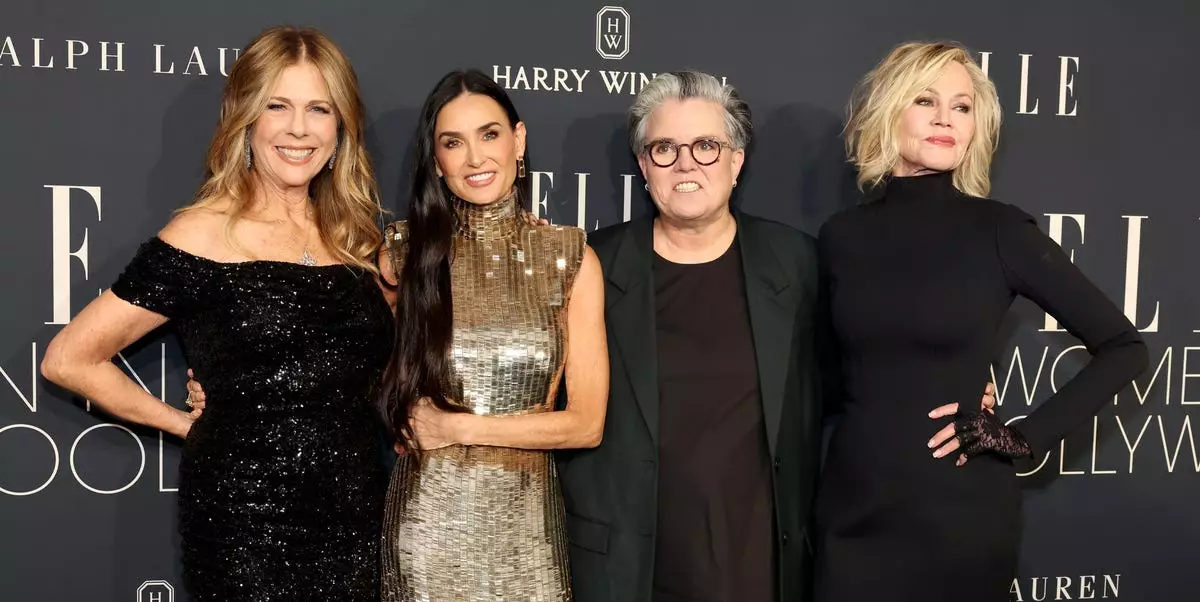The atmosphere at ELLE’s Women in Hollywood event was electrifying, as it blended nostalgia with contemporary celebration. Not only was this significant gathering held in collaboration with prominent brands such as Ralph Lauren, Harry Winston, and TikTok, but it also served to honor the enduring legacy of women’s contributions to film. Central to this celebration was the reunion of the cast from the 1995 classic “Now and Then,” a landmark film that highlighted women’s experiences in a male-dominated industry. Melanie Griffith, Rita Wilson, and Rosie O’Donnell took the stage to introduce the evening’s honoree, the iconic Demi Moore.
The importance of this event extended beyond mere celebration; it acted as a powerful reminder of how far women in Hollywood have come since the release of “Now and Then.” The reunion was not just a trip down memory lane, but also a testament to the significance of collaboration among women in film, emphasizing how they have created spaces and narratives for themselves in a historically inequitable industry.
With genuine affection, Griffith recounted her experiences working with Moore, reflecting on how the film was groundbreaking for its time, being produced, written, and directed by women. The comments by O’Donnell further highlighted the feminist undercurrents of the production, emphasizing how important it was to have a narrative driven by female perspectives. “A story about women produced by women, written by a woman, directed by a woman, and starring primarily women,” she reminded the audience, encapsulating the essence of the film that resonated with so many.
This celebration was also seismic when considering the cultural shifts in Hollywood. Wilson poignantly remarked about Moore’s iconic Vanity Fair cover, which featured her seven months pregnant and nude, an audacious move that, while shocking at the time, now seems almost quaint in today’s world where celebrity nudity is less about provocation and more about empowerment. O’Donnell interjected humor, reminding the crowd about societal expectations of women and body image in Hollywood, while lamenting societal norms that are often unkind to women as they age.
The career trajectory of Demi Moore was also a focal point during this celebration. As Griffith noted, Moore wasn’t a mere starlet; she was a multifaceted powerhouse, notching box office successes with roles as strong, lead characters in films like “Ghost” and “A Few Good Men.” These performances portrayed complex women at pivotal points in their lives, a rarity during that era.
Moreover, Moore didn’t stop at acting—her prowess in producing set her apart as a true trailblazer. O’Donnell emphasized the variety of films that benefitted from Moore’s vision—“G.I. Jane,” and “If These Walls Could Talk,” for instance—showing her versatility and commitment to quality storytelling. The impact of these productions continues to echo within Hollywood’s framework, pushing the boundaries of what stories women can tell.
The conversation shifted towards Moore’s present and future at the event. Griffith humorously coined the term “Demi-ssance,” suggesting that Moore is experiencing a resurgence reminiscent of a cultural renaissance. This revival reflects the growing acceptance of women at various stages of their careers in Hollywood, highlighting how the industry is learning to celebrate, rather than sideline, experienced actresses.
The affection between the actresses was palpable, as they gathered for photographs later in the evening, signaling their mutual admiration for each other and the film that helped shape their careers. A reunion photo shared by Moore on social media emphasizes the enduring bond they share, a testament to the friendships forged through shared experiences in a challenging industry.
The ELLE Women in Hollywood event was more than just a nostalgic look back; it was an affirmation of the power of female representation in film. As the quartet reminisced, they ignited conversations about the future for women in Hollywood, showcasing that their journey is ongoing. As we honor icons like Demi Moore, we must also acknowledge the importance of continuing to create spaces for women’s stories. This event serves as a clarion call for more women to step into the limelight and share their narratives, ensuring that the impact of films like “Now and Then” endure for generations to come.

